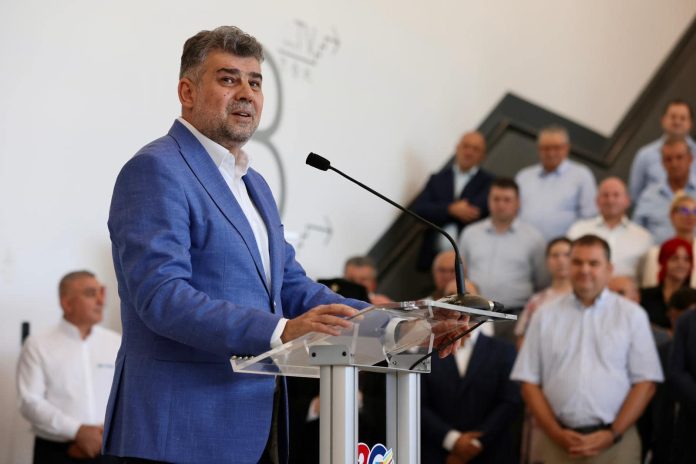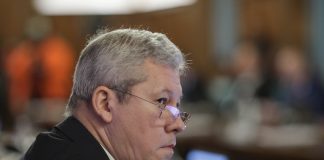Speaker of the Chamber of Deputies of the Romanian Parliament Marcel Ciolacu, asks the Austrian Chancellor, Karl Nehammer, „to do the right thing and reverse his government’s decision” on Romania’s accession to the Schengen area, Agerpres reports.
In an opinion article that he signs on Thursday on the website https://www.politico.eu, Marcel Ciolacu, also leader of the Social Democrtic Party (PSD), presents the arguments why Romania’s accession to Schengen would strengthen Europe.
„While the free world is being tested by Ukraine’s vicious invasion by President Vladimir Putin’s Russia, here in Europe, in the fight for democracy and resilience, we must always look to strengthen the democratic institutions that keep us safe, strong and secure.
Now is the time when we must all stand together or fail alone. And in this regard, one essential opportunity before my colleagues in the European Union right now is the continued reform and expansion of the Schengen area. A growing Schengen can further unify Europe both practically and symbolically, advance democracy, strengthen economic recovery and bolster our collective security against increasing foreign threats.
Regrettably, however, the government of Austrian Chancellor Karl Nehammer has decided to move Europe and our collective security in a different direction.
Austria’s rash and ill-defined decision to deny Romania access to the Schengen area weakens not only our region but Europe as a whole, while encouraging the forces aligned against us.
Surprisingly, this damaging decision comes at a time when I’ve been most heartened by the combined global efforts to ensure Ukraine and its heroic people live free once again. The acts of solidarity run deep: the G7’s and G20’s strong commitment; advanced NATO cohesion and expansion with Sweden and Finland; the instrumental role played by the United States; and the Ukraine donor conference hosted by French President Emmanuel Macron in Paris, which was attended by 46 countries. As the world stands up to the injustice of Russian aggression, the list goes on.
By now, we all should have learned the lessons of history, that if you don’t stand up to a tyrant today, they will be in your backyard tomorrow. And the Romanian people know this reality all too well.
The February 24 invasion of Ukraine changed everything, and for us, the shock hit close to home. Having the longest border with Ukraine of any EU or NATO country, we suddenly found ourselves on the front line of the battle for democracy.
Thankfully, the Social Democratic Party, which I now lead, had brought Romania into NATO and the EU at the right time. As a strategic economic and security hub with some of the most vital Black Sea ports, Romania knew it had to act as a shield around Ukraine. Our very democratic way of life was at stake, along with the shared values and aspirations of our friends and neighbors in Europe. And we’ve proved ourselves up to the task.
Romania has welcomed over 3 million Ukrainian refugees fleeing violence. It’s utilized its Black Sea ports and internal rail systems to transport over 60 percent of Ukrainian grain to feed the world sometimes to the detriment of our own farmers. And it has also provided an essential energy lifeline to Moldova, countering Putin’s energy warfare and societal agitation against the country’s pro-West leadership.
Additionally, since 1991, Romania has met every set milestone to fully integrate with the Euro-Atlantic community, from accession to NATO, to European Union membership and, now, our application to join the Schengen area the largest visa-free zone in the world.
For Romanians, the advantages of being inside the Schengen area will be profound. Our minister of finance estimates that Romania loses 10 billion each year from being excluded. And at a time when our Black Sea ports and rails have become central to the flow of grain, energy and other essentials to Europe, the free flow of goods to and from our country is more important than ever.
Yet, it is unclear why Austria chose to draw the line at our border based on arguments that defy hard data.
Romania already proved it had the capacity to manage the EU’s borders as early as 2011, and with our military alongside NATO forces on the eastern flank, we are defending Austria just as much as we are defending the rest of Europe. Even with tight budgets, Romania has pledged 2.5 percent of its GDP for defense funding, and our navy dismantled a Russian floating mine in the Black Sea to protect free navigation.
Our port in Constanta is now one of the busiest in Europe, providing an alternative route to the Continent. Meanwhile, we recently signed an energy agreement with our Black Sea allies to move energy into Europe through Romania, and have welcomed many Austrian businesses and investors seeking to capitalize on our workforce and ideal location.
To fight back the rising tide of authoritarianism, democracies need to stand together and strengthen the links that connect them. Thus, I ask Chancellor Nehammer to do the right thing and reverse his government’s decision.
I am confident that in working together, we will find our power. Europe will be stronger for it as will Austria,” Marcel Ciolacu concludes the opinion article.
Agerpres




